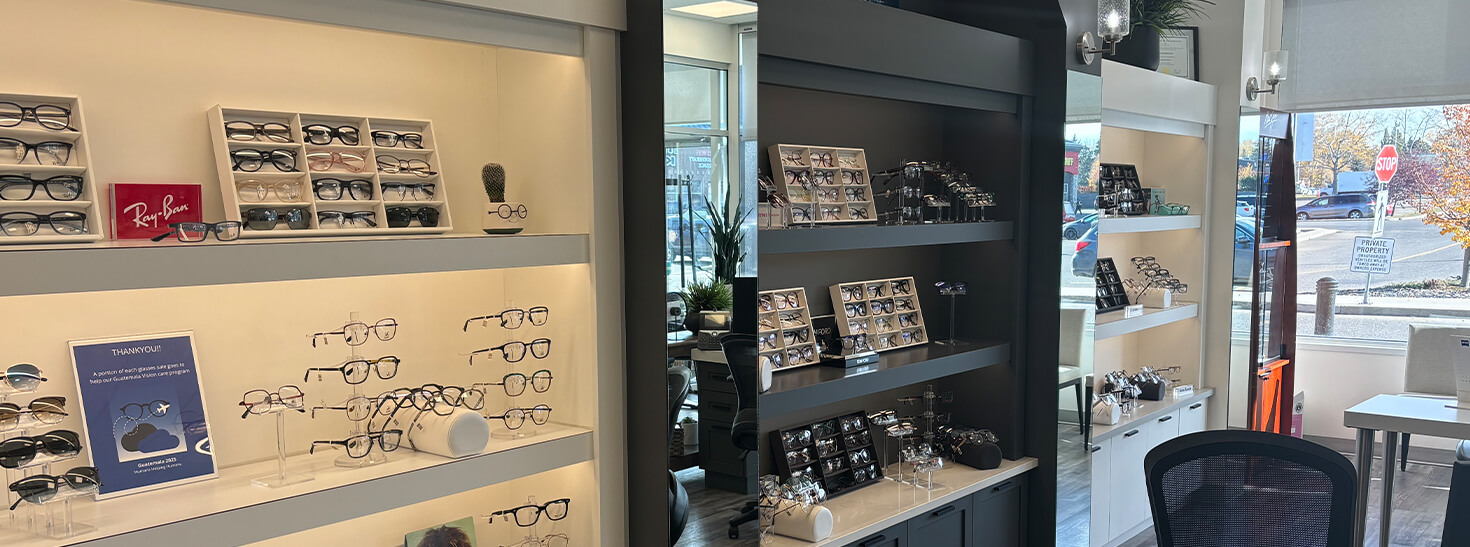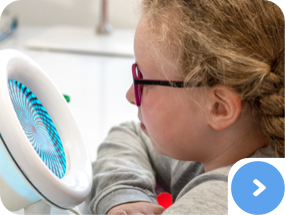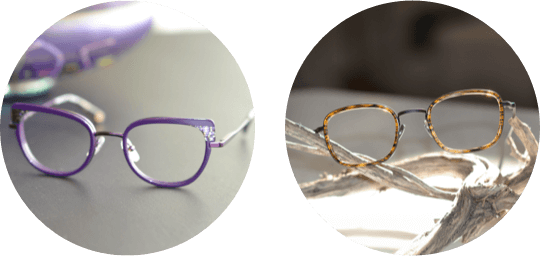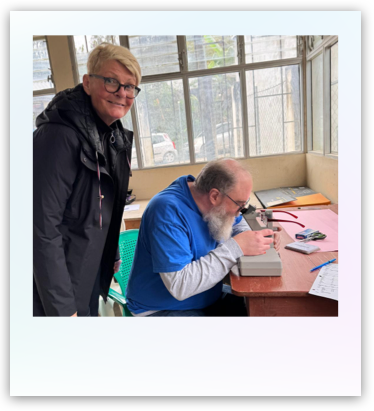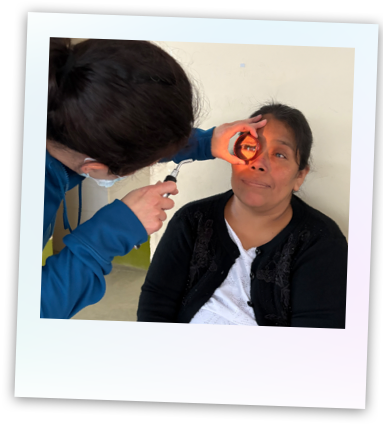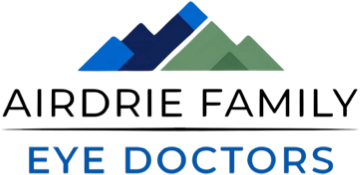Ever caught yourself squinting at a menu or holding your phone a little farther away than usual? Maybe your child is sitting way too close to the TV. These little habits can be your eyes’ way of saying, “Hey, we could use some backup here!”
Your eyes often send signals when they need more support, and paying attention to them can help you take care of your vision. Learning to identify these common signs can help you know when it’s time for a comprehensive eye exam. It’s a simple way to stay on top of your eye health and maintain clear, comfortable sight.
Your eye doctor will assess your eyes to let you know when it’s time for glasses.
Common Signs & Symptoms of Vision Change
Your eyes often give subtle clues when they need support. If you notice any of these common signs, it might be time to look into your vision health. These symptoms can appear gradually, so it helps to know what to watch for.
Visible Difficulty & Discomfort
You might notice direct changes in what you see. These signs often relate to the clarity and quality of your vision in different situations.
- Blurry vision for objects near or far
- Double vision
- See halos or glares around lights
- Trouble seeing in low light or at night
Physical Sensations
Sometimes, the signs of vision change are physical feelings rather than visual problems. Your body may be telling you that your eyes are working too hard to focus. These feelings can sometimes be related to digital eye strain, especially after long hours on a computer.
- Frequent headaches, especially after you read or use a screen
- Tired, aching, or heavy eyes
- Watery eyes or excessive dryness
- The urge to rub your eyes often
New Habits & Behaviours
You may develop new habits without even realizing it. These actions are often your brain’s way of trying to compensate for a change in your vision.
- Squinting to see better
- Holding reading material at arm’s length
- Needing brighter light than before
Fun fact: Owls can’t move their eyeballs like we do. Instead, they swivel their whole heads up to 270°! If you’re finding yourself turning your head too much to see clearly, it’s time for an eye exam.
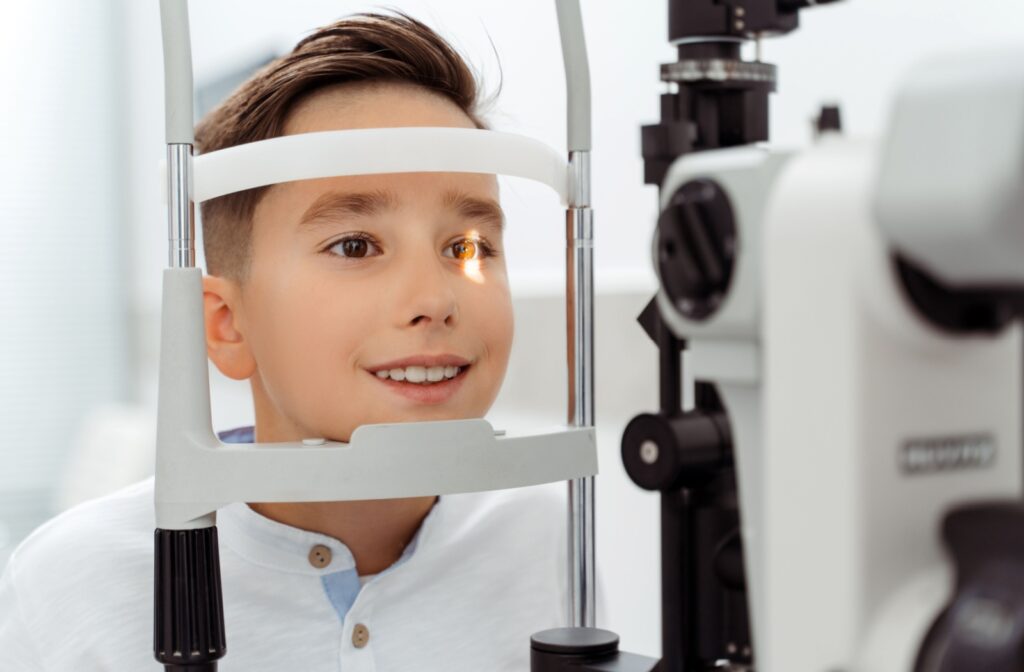
Common Reasons for Vision Correction
If you experience the symptoms above, it may be due to a common vision condition known as a refractive error. This happens when the shape of your eye prevents light from focusing correctly. These conditions are quite common and can often be addressed with corrective lenses.
Nearsightedness (Myopia)
Myopia makes distant objects appear blurry, while close-up objects typically remain clear. It can make activities like driving, school work, or watching a presentation difficult.
- Difficulty seeing road signs or a whiteboard
- Eye strain
- Squinting to see distant objects
Farsightedness (Hyperopia)
With farsightedness, you may see distant objects clearly, but things up close can look out of focus. This can affect tasks like reading or working on a computer.
- Blurry vision when you read or use a computer
- Headaches after close-up work
- Eye strain
Astigmatism
Astigmatism happens because of an imperfection in the shape of your eye’s cornea or lens. This causes distorted or blurry vision at all distances.
- Blurry or distorted vision
- Poor night vision
- Headaches & eye strain
Presbyopia
This is an age-related condition that typically starts after age 40. It becomes more difficult to focus on close-up objects as the lens inside your eye becomes less flexible. Presbyopia is a natural part of aging and is very common.
- A need to hold reading materials at arm’s length
- Blurry print
- Headaches or eye fatigue during close tasks
Signs Your Child Might Need Glasses
Children may not always tell you they have a vision problem. They might think what they see is normal, so it helps to watch for certain behaviours.
If you notice any of these behaviours, it could be a sign that your child is having trouble with their sight:
- Sitting too close to screens
- Tilting their head or closing one eye
- Struggling with schoolwork
- Bumping into things more than usual
- Complaining of headaches or eye pain
Think of it like this: if your little one is squinting more than a pirate looking for buried treasure, it’s worth getting checked.
Did you know? Goldfish can see more colours than humans! (So if your child thinks their orange crayon is actually pink, it might not be imagination—it could be their vision.)
Why an Eye Exam Matters
A complete eye exam is the only way to determine your exact prescription and to check the overall health of your eyes. Unlike a simple sight test, a comprehensive exam is a thorough health check that can identify the specific cause of your symptoms. They can then suggest a suitable solution for your needs.
How Our Eye Doctors in Airdrie Can Help
During an exam, your eye doctor will perform a series of tests to evaluate your vision. They will check how clearly you see, how your eyes work together, evaluate the health of your eyes, and look at the structures inside your eye.
Based on the results, they can discuss options like glasses or contact lenses with you.
Your Journey to Clearer Vision
Once you have a prescription, you can take the next step toward better sight. The process involves more than just getting lenses; it’s about finding a solution that fits your life.
Get Your Prescription
Your prescription is a detailed map created just for your eyes. It tells the lens maker exactly how to shape the lenses to correct your specific vision. This ensures your new glasses are tailored to your unique needs.
Select Frames that Suit You
Choosing the right eyeglass frames is a personal decision that reflects your style. You can think about frames that complement your face shape and suit your daily activities. The right pair should feel comfortable and make you feel good.
Adapt to Your New Glasses
When you first get new glasses, your eyes and brain may need a little time to adjust. It’s normal to experience a short adjustment period as you get used to seeing through your new lenses. Soon enough, your clear new vision will feel completely natural.
Take a Step Towards Clearer Vision Today
Whether you’re squinting at road signs, helping your child with homework, or just wondering why your eyes feel tired, we’re here to help.
We believe that everyone deserves to see their world clearly and comfortably. If you have questions about your vision, the team at Airdrie Family Eye Doctors is here to help. Contact us to schedule an appointment and take the first step toward better sight.
